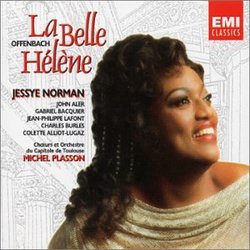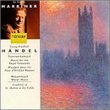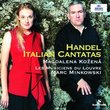| All Artists: Jacques Offenbach, Michel Plasson, Jessye Norman, John Aler, Choeurs et Orchestre du Capitole de Toul, Charles Burles, Gabriel Bacquier, Jean-Philippe LaFont, Colette Alliot-Lugaz, Roger Trentin Jacques Loreau Title: Offenbach - La Belle Hélène / Jessye Norman, John Aler, Bacquier, Lafont, Burles, Alliot-Lugaz, Capitole de Toulouse, Plasson Members Wishing: 0 Total Copies: 0 Label: EMI Import Release Date: 9/4/2001 Album Type: Import Genre: Classical Style: Opera & Classical Vocal Number of Discs: 2 SwapaCD Credits: 2 UPC: 077774715782 |
Search - Jacques Offenbach, Michel Plasson, Jessye Norman :: Offenbach - La Belle Hélène / Jessye Norman, John Aler, Bacquier, Lafont, Burles, Alliot-Lugaz, Capitole de Toulouse, Plasson
 | Jacques Offenbach, Michel Plasson, Jessye Norman Offenbach - La Belle Hélène / Jessye Norman, John Aler, Bacquier, Lafont, Burles, Alliot-Lugaz, Capitole de Toulouse, Plasson Genre: Classical
|
Larger Image |
CD DetailsSimilarly Requested CDs
|
CD ReviewsSimply delightful BDSinC | Calgary, Alberta, Canada | 07/13/2003 (5 out of 5 stars) "As far as I know, there are no other recordings of this operetta. I was simply amazed at how delightful it is. This is one recording where the singers seem to really enjoy what they are doing. Norman sings wonderfully, and I have to admit, I would never have thought of her singing this role. Her heavy voice takes nothing from it, and her joy is evident every step of the way. Aler sings most convincingly, even though he may be a rather lightweight tenor to sing opposite Norman. Still, they mesh so beautifully in the duets. One of the most delightful arias is not for either lead, but one of the other characters. It is the "um-pa-pa" song. It is a hoot. This entire recording is sparkling with delight from beginning to end. The dialogue is wonderful, and for once we are treated with the leads actually speaking their lines and not actors filling in for them. This is definitely FRENCH operetta, so it must not be compared to Strauss at all. It is completely different in style. This is a work that actually makes fun of the serious story of Helen of Troy. One must see it for what it is, and then one will enjoy it. The musical preparations are delightfully thrilling, and the dialogue moves forward not stopping the momentum that has proceeded it. Truly a delight." Simply Delightful -- Bis! -- The Recording to Have Terry Serres | Minneapolis, MN United States | 10/18/2006 (5 out of 5 stars) "_La Belle Helene_ is my favorite operetta, with 6 audio and 2 video versions in my collection. This is the one I treasure most. Plasson's baton is a magic wand, stirring up every scintilla of wit and every bubble of effervescence in the score. Norman is the consummate sex kitten in the role of La Belle Helene. Even her way with the dialogue is faultless -- listen to how she purrs "Avez-vous de nouveaux details?" when asking Calchas about the latest news concerning her oracled abduction. Her "Amour divins" is both beautiful and hilarious in its swooning rapture, abetted by her sympathetic chorus. John Aler has just the effortless high tenor you want in the golden boy Paris; his performance is full of seductive charm. Jean-Philippe Lafont (seen in the film "Babette's Feast" as the opera singer who woos one of the patriarch's daughters) is a singing actor of distinction, at once mellifluous and riotous. He's so much fun in his dialogues than you're never in a hurry for the next musical number. Even the scene with the riddle-contest, with its intricate word-games in French, is flawlessly executed. Colette Alliot-Lugaz nails the trousers role of Oreste, and Gabriel Bacquier is caviar casting as Agamemnon. This recording has so much personality, you never miss the visual element. I do relish the Minkowski recording and, especially, the DVD. He's a favorite conductor, presently unrivaled in Offenbach. Felicity Lott sounds long in the tooth, and a bit dyspeptic, as Helene in Minkowski's recording; but when you see it staged on the DVD of the same production, it makes sense -- the operetta is staged as the fantasy of a frustrated middle-aged woman. Yann Beuron as Paris, Francois Le Roux as Calchas, and Michel Senechal as Menelas are all splendid. But the Plasson recording under review here is just a step above. If you like this operetta, you must have this recording. It keeps going in and out of distribution, so get it while you can." A wonderful Gallic romp - and some great singing Ralph Moore | Bishop's Stortford, UK | 07/29/2009 (5 out of 5 stars) "With two (albeit highly accomplished) Americans in the lead roles, the obvious question is whether they can carry off the Gallic charm exemplified by French artists in previous versions of this sparkling operetta. However, comparison with the classic, mono 1952 recording conducted by René Leibowitz (actually a Francophile Pole) starring Janine Linda (aka Janine Lindenfelder) and André Dran, reveals that this 1984 performance is by no means deficient in French style. As you might expect, Jessye Norman and John Aler are more careful and less spontaneous in their delivery of the dialogue, but they clearly studied to acquire beautiful accents and manage to inflect their words most amusingly - I love Aler's smug "C'est moi" when he confirms the identity of the handsome young shepherd in his famous aria narrating "The Choice of Paris". Similarly, Norman puts a lovely wheedling and very Gallic pout into her voice. Both artists, of course, have wonderful voices. Aler's light tenor has all the heady charm associated with the now virtually extinct French tenor typified by Dran and Alain Vanzo: in the ensemble "Qu'avez-vous fait de son honneur?", he sings superbly and in full voice the roulades by which Offenbach mocks bel canto scales- whereas Dran does the whole thing in falsetto. Nobody can erase memories of Björling's stunning 1938 account (in Swedish!) of the tenor's big number "Au Mont Ida", but Aler sings it gracefully and easily - and he yodels at Olympic level at the end of Act 3.
Norman's Rolls-Royce-voice is a very different vehicle from Linda's piping-but-pleasing soubrette and it is a real treat to hear her enwrap Offenbach's exquisite melodies in such sumptuous tone. She sings a glorious, full-voiced top C, majestically leaps the intervals of a ninth in the"Invocation à Vénus" and thoroughly enjoys the diva -esque ornamentation in the absurd "l'homme à la pomme", but can also lighten her voice when required. Her main trick, however, especially in the dialogue, where she reveals an unexpectedly camp sense of humour, is to play the husky, smoky-voiced vamp, whereas Linda's portrayal is a more conventional, deploying the saccharine charms of a "cocotte". Both voice types and characterisations are equally effective in their way. The supporting cast contains some famous names and they are clearly having a high old time, released from the sombre demands of Grand Opera to whoop it up in Offenbach's wry romp. Plasson's way with the score is more leisured and affectionate than Leibowitz, whose delivery is more pungent and pacier, but the ensembles zip along with zest and vigour. The March of the Kings is hilarious, and even if the Toulouse forces do not have quite the élan of Leibowitz' Parisian orchestra, Plasson's voices are clearly classier. While Leibowitz gives us something more recognisable and perhaps more valuable in its links with a virtually vanished vaudeville tradition, Plasson still knows how to spin the seductive waltz melody in the "Entr'acte" and makes us newly aware of the cross-fertilisation between the Opéra Comique and Viennese operetta, as in the parallel between the ironic farewells to irksome husbands found at the end of Act 1 and "O je, O je, wie rührt mich das" in Act 1 of "Die Fledermaus" (1874). Strange to think that this satirical treatment of the ancient Greeks by Offenbach and his librettists caused scandal and aroused condemnation by more the high-minded critics; its humour has worn rather well and sits comfortably with our cynical, liberal age. The puns and word-plays ("gaga-memnon") are still witty and edgy - so more's the pity that, despite EMI's invitation to locate and download the libretto from their website, no such thing seems currently available. I hope that is remedied soon, as unless your French is pretty fluent, you really need the words to appreciate fully this splendid recording, which is now a quarter-century old and wearing its years lightly. But why is this priced so high? On Amazon.uk it's a snip at around £7; surely a mistake here. " |

 Track Listings (19) - Disc #1
Track Listings (19) - Disc #1




